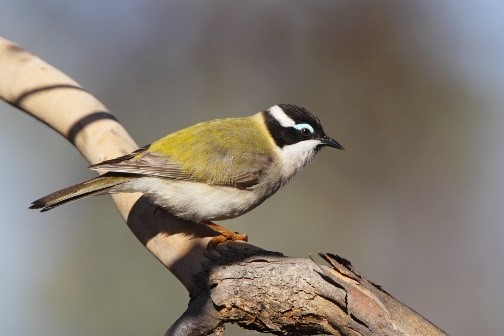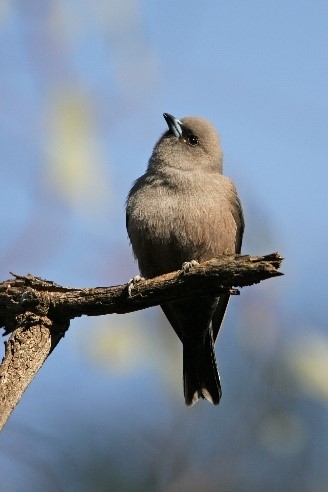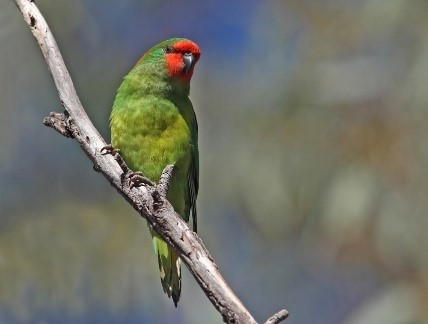Birds on Farm Southern NSW project - update
15 Jul 2021
REGIONAL ROUNDUP - JULY 2021 - FEATURE ARTICLE
By Rhonda Vile and Ben Humphries
Southern NSW Woodland Bird Project Officers with BirdLife Australia.
 Birds on Farms southern NSW project is a targeted citizen science monitoring program coordinated by BirdLife Australia (BA) for farmers and other rural landholders, scientists, bird-lovers and the general public, across an area extending from Albury to Corowa, Henty to Holbrook and east to Jingellic. The program has a focus on grassy woodlands and aims to learn more about bird distribution, population health and habitat use on private rural properties - and to use this information in woodland bird conservation and protection. Importantly, the project also engages landholders in bird identification, appreciation of their behaviour, ecology and habitat use.
Birds on Farms southern NSW project is a targeted citizen science monitoring program coordinated by BirdLife Australia (BA) for farmers and other rural landholders, scientists, bird-lovers and the general public, across an area extending from Albury to Corowa, Henty to Holbrook and east to Jingellic. The program has a focus on grassy woodlands and aims to learn more about bird distribution, population health and habitat use on private rural properties - and to use this information in woodland bird conservation and protection. Importantly, the project also engages landholders in bird identification, appreciation of their behaviour, ecology and habitat use.
On-farm surveys are undertaken by experienced birdwatchers (landowne rs and/or volunteers) on private rural land. Survey points are placed in a variety of natural and agricultural habitat types, which are then monitored for all birds once every three months using the 20-minute-two-hectare survey method. The sightings are compiled within BirdLife Australia’s database (https://birdata.birdlife.org.au/), with the results periodically summarised and distributed to the participants and more broadly.
rs and/or volunteers) on private rural land. Survey points are placed in a variety of natural and agricultural habitat types, which are then monitored for all birds once every three months using the 20-minute-two-hectare survey method. The sightings are compiled within BirdLife Australia’s database (https://birdata.birdlife.org.au/), with the results periodically summarised and distributed to the participants and more broadly.
The Birds on Farms southern NSW project has been monitoring birds on farms in this area since November 2019, supported by the NSW Government’s Saving our Species program. The project has focused on threatened target species - black-chinned honeyeater (top right, photo Dean Ingwerson), dusky woodswallow (middle right, photo Dean Ingwerson) and little lorikeet (bottom right, photo Chris Tzaros).
Between 18 June 2020 and 14 June 2021:
- 398 Southern NSW Birds on Farms surveys completed (winter, spring, summer, autumn).
- Over 30 properties and 12 volunteers participating, with new landholders and volunteers joining each survey period.
Most frequently sighted species during surveys have been magpie, eastern rosella, galah, white-plumed honeyeater, superb fairy-wren and willie wagtail. Significant woodland birds detected during surveys included superb parrot, speckled warbler, flame robin, scarlet robin, restless flycatcher, grey-crowned babbler, glossy black cockatoo, diamond firetail, crested shrike-tit and brown treecreeper.


Little lorikeets are yet to be recorded within a Birds on Farms site during a survey period. However, being a nomadic species, there have been little lorikeet sightings reported over the past 12 months within our project area. Hopefully they turn up in some flowering eucalypts during our spring surveys!
NOTE: From this year, the project scope will expand to include a long-term focus on 32 bird species identified as threatened or declining in this southern NSW landscape by BirdLife Australia’s Temperate Woodland Bird Conservation Action Plan.
Surveys!
We have several landholders who have their properties set up with survey points ready-to-go but who require assistance from an experienced volunteer birdwatcher. Volunteer birdwatchers get to be part of the process and search for birds in previously ‘unexplored’ territories (albeit it on a property-scale!). Surveys can be completed within a day, and a range of support materials are provided.
If you have friends, colleagues or family members that would be potentially interested – or perhaps you are interested – please let us know if you would like to assist.
Our winter survey period has almost finished. Our spring survey dates are Saturday, 25 September to Sunday, 7 November, 2021.
There is extensive background and support information available on the website, which also summarises the broader aims and objectives of the program:
http://birdlife.org.au/birds-on-farms
Alternatively, if you are interested or would like to know more about the surveys or any other aspects of this project, you can contact ben.humphries@birdlife.org.au or rhonda.vile@birdlife.org.au